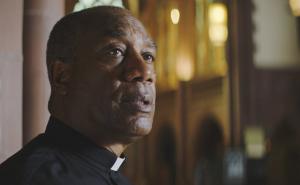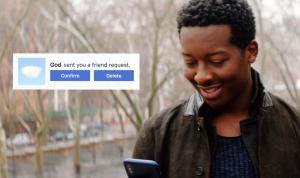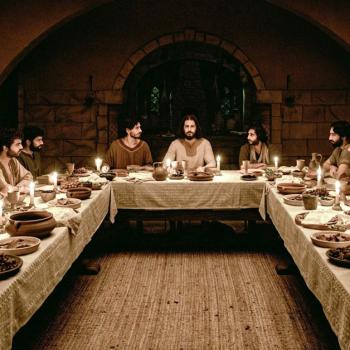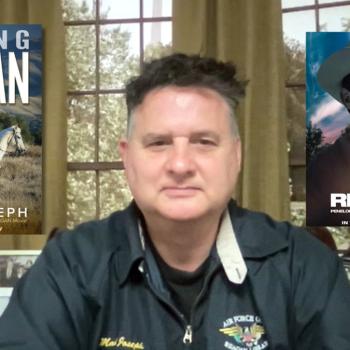
I’m four episodes in on CBS’ God Friended Me, and I’m going to watch episode five. Since I can count the number of network shows I watch regularly on one hand, that’s something.
If you haven’t heard of the show, click here and here and here to find out all about it, and then come on back. If you’re behind on episodes, they’re available On Demand, at CBS.com, at the CBS app on iTunes and Android, and at the CBS All Access OTT service. I caught up at CBS.com on my tablet.
Airing Sundays at 8 p.m. ET/PT, God Friended Me is the creation of Steven Lilien and Bryan Wynbrandt, and it’s executive-produced by the prolific Greg Berlanti (Riverdale, Titans, Legends of Tomorrow, Supergirl, Black Lightning, The Flash, Arrow, Blindspot and the new All American). It also just got a pickup from CBS that rounds out its first season.
In brief, the show centers on atheist podcaster Miles Finer (Brandon Micheal Hall), who gets a Facebook friend request from an account claiming to be God. This sends him on a trajectory of friend and location suggestions that involve the basically good-hearted guy on both a quest to discover the truth behind the “God account” and to help the various folks thrown in his path.
Here are some of my thoughts so far:
The Characters in God Friended Me Are Essentially Good People, and That’s a Nice Change
Miles lost his faith because of a personal tragedy, and that’s common. Some atheists were irritated at that, because his choice of unbelief wasn’t based on philosophy or intellectual study, but, hey guys, that would make for dishwater-dull TV. But, while Miles is irritated at the God he doesn’t believe exists, he’s not angry at the world … and that makes him watchable.

His father, Episcopalian minister Arthur (Joe Morton) is a warmhearted man of faith, trying to cope with being a widower and parenting kids whose ideas don’t always jibe with what he wants. Again, relatable.
Miles’ bartender sister, psychology student Ali (Javicia Leslie) — who’s still in her father’s flock — was revealed definitively in episode three as a lesbian. But, the producers said that in a press conference back in August, and it was hinted at in earlier episodes. Since Berlanti is gay, this shouldn’t come as a surprise. But Berlanti (who was raised Catholic and told me he periodically attends Mass to please his mother) isn’t a drum-beating, strident activist (I’ve known him since Everwood, and he’s a good guy), and Ali isn’t either.
Let’s face it, kids whose sexual lives don’t match up to religious parents’ beliefs are legion. So, in all its permutations, it’s an issue that many families face. So far, it’s been handled with sensitivity. Let’s hope that continues.
Journalist Cara Bloom (Violett Beane), Miles’ first friend suggestion and now his partner-in-investigation, is dealing with the aftermath of finding her long-lost mother. She’s got a bit of a thing for Miles — and it’s reciprocated — but she’s making bank off the stories the “God account’ is feeding her. So, with a big promotion looming, she’s afraid that if she steps from friendship to romance with Miles, it may mess up her career. And now there’s a hot ex-boyfriend. (Cara, honey, your career is not worth taking a chance on losing Miles. Just my two cents.)
Miles’ best pal, co-worker and hacker Rakesh (Suraj Sharma), is also goodhearted and sweet, if romantically clueless. He’s helping Miles track down the “God account,” while trying to stay on track with new love Jaya (Shazi Raja). His one-night stand from the pilot, though, has vanished.
And thus far, everyone they’ve helped has turned out to be a pretty good person, too. Is it unrealistic? Well, yeah, in all kinds of ways, but in a dark TV world, it’s refreshing to see people that, while they have a range of problems, are basically solid citizens.
The Plotlines in God Friended Me Are Complicated and Chock-full of “Coincidences”
As a fan of such 1980s-’90s shows as Quantum Leap and Early Edition — or Touched by an Angel, Highway to Heaven and, currently, Hallmark’s Signed, Sealed and Delivered, other shows in this general vein — this sort of storytelling appeals to me. Each week, the episode-specific characters undergo transformation, while the main characters track on a longer arc.
Also, the episodes say a lot about the way our choices impact our lives, and how, if we take leaps of faith — trusting in God or the “God account” — we can wind up somewhere we never dreamed of. In all of the shows mentioned, a random “assignment,” often from a semi-mysterious higher power, sends the main characters on a mission, involving them in the lives of strangers in unexpected ways.

Overall, it’s a tricky tone and style to hit without being treacly. So far, God Friended Me gets very close to the line but manages not to go over. Underneath all of these shows is an essential belief in the redemptive possibilities in people, if they’re willing to take chances and go in a different direction.
As Miles says at one point, he doesn’t believe in God, but he believes in second chances.
The Theology of God Friended Me: Kinda Christian But Not Exactly — and a Bit Denominationally Confused
While a Christian minister is a character, God Friended Me is not a show explicitly about any particular view of God (although the basic Judeo-Christian messages of helping neighbors, love, charity, etc., are its underpinnings). It’s more a show aimed at Millennial “nones,” who aren’t sure what they think. At the same time, it’s not actively promoting atheism … not yet, anyway.
In one episode, a single mother Miles is helping asks him if he belongs to a church, since he’s doing “God’s work.” No doubt some of Miles’ upbringing rubbed off, whether he admits it or not. Also, Miles’ willingness to have an open conversation about faith in his podcast drove off a lot of his atheist listeners — and that seems realistic.
Like many shows and movies seem to feel obligated to do these days, God Friended Me deals with LGBT issues, especially as they relate to Christianity. In the episode featuring Ali’s sexuality, Rev. Arthur speaks about losing a quarter of his congregation after openly accepting and loving his daughter. He obviously would rather the situation for her were different, but he loves her anyway, as he does his atheist son. Anyone who’s cracked a Catechism knows that, while the Catholic Church decries homosexual behavior, it absolutely forbids unjust discrimination against those with same-sex attraction and insists they be treated with love, compassion and dignity.
How that shakes out in every individual parent/child relationship is different, but of course, we’d want Rev. Arthur to continue to love and support his daughter, even if he disagreed with her lifestyle.
I’m a bit confused, though, because, since he’s an Episcopalian minister, it’s puzzling that he’d lose a quarter of his congregants over accepting Ali’s sexual orientation. That seems at odds with the current state of the Episcopal communion.

Arthur also gives the line that faith should bring us together rather than divide us, but in honesty, if you firmly believe anything, it’s going to put you in opposition to somebody. Even Christ said he did not come to bring peace but a sword. The idea that religious faith is some kind of a magic spell that makes everybody play nice all the time is childish.
If you speak the truths of Christianity, you’re going to upset some people. The only way to avoid it is to avoid the truth, water it down, sand off all the rough edges, ultimately reducing it to nothing but social work, potlucks and singing (which happens a lot these days).
But, as I said, God Friended Me is a not a show about Christian apologetics. It’s working on a much more simple spiritual level, and that’s where a lot of folks are these days. It’s also not bashing anyone, which is a great relief.
My Conclusion So Far on God Friended Me
God Friended Me is positive, uplifting, hopeful and has kindness at its core. Its ideas and its characters’ actions may conflict with Catholic belief, but nobody on this show — so far — is Catholic (and that may be a blessing, considering how often TV gets us wrong, and how often we are publicly, and rightfully, called out for falling short of our own beliefs).
If the show gets people who’ve never thought deeply about God to give it a try, that’s a great place to start. It’s then up to us believers — not a TV show — to lead them the rest of the way.
Images: Courtesy CBS


















